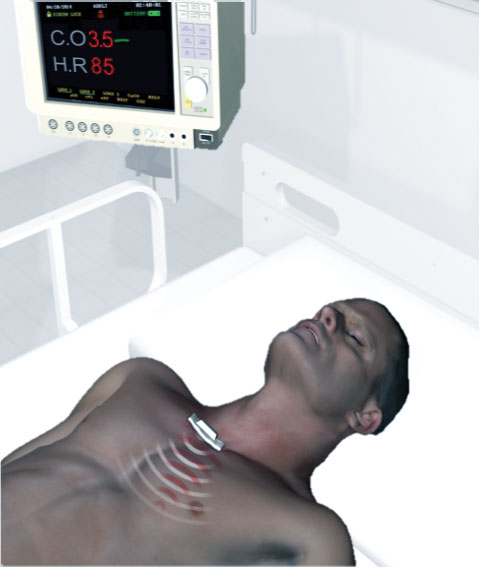Start-Up Spotlight: Hemonitor, Continuous Bloodflow Monitoring With Ultrasound
Executive Summary
Israeli start-up Hemonitor Medical is hoping to make waves with a new hemodynamic monitor that uses an ultrasound patch technology to continuously monitor blood flow in ICU patients or patients in surgery. The company is the first start-up to be taken in by MindUP, Israel's first digital health incubator and a joint partnership between Medtronic, IBM, Pitango Venture Capital, Rambam Hospital and the Impact First investment fund.
The crucial need for a less-invasive method of measuring cardiac output has long been the focus of development for medical device companies. The current gold standard, thermodilution, involves inserting a thermistor-tipped catheter into the pulmonary artery via a peripheral vein. While effective, this technique of measuring cardiac output is invasive and not without risks. The high cost associated with the procedure also restricts healthcare professionals from measuring the cardiac output of every patient entering ICU or sedated in surgery.
One Israeli start-up, Hemonitor, is developing a new non-invasive solution - a hemodynamic monitor that uses a wearable ultrasound patch technology for continuous monitoring of blood flow. "There have been several attempts to solve the need in clinical practice by doing indirect non-invasive measurements of other parameters to assume what the cardiac output is but there is still no direct solution which is non-invasive or continuous," Hemonitor CEO and co-founder Tom Mayblum told Medtech Insight.
The concept for the technology evolved from a joint project carried out by Mayblum and his co-founder Samer Toume. Both were biomedical engineering graduates of the prestigious Technion Israel Institute of Technologyin Israel. Hemonitor initially envisioned using ultrasound technology for monitoring internal bleeding and began to meet with physicians and directors of ICU trauma. "We’ve learned that there is no need for a solution based on our technology. However, we did identify a different need which was hemodynamic monitoring of ICU patients or patients under surgery where there is a need to continuously monitor the blood flow or the actual volume of blood which flows on every heart beat," said Mayblum.
After validating a clinical need for the solution, the pair solidified their business plans through the Technion's Accelerator entrepreneurship program for pre-seed and seed companies. In December 2016, the start-up was the first company to be accepted by MindUP, Israel's first digital health incubator and joint partnership between Medtronic, IBM, Pitango Venture Capital, Impact First Investments and Rambam Medical Center. As part of the two-year program, the company is supported through the stages of development, clinical studies and regulation.
By the end of 2017, Hemonitor aims to have completed testing and development of a fully functional autonomous, continuous and non-invasive ultrasound-based system for patient monitoring. "We call it autonomous because – in contrast to standard ultrasound devices, with a probe that is manually held and requires a trained physician to find the correct orientation of the probe and search the blood vessel in the image etc. – with this device, it will have the ability to search for the vessel and track the movement of the vessel, so it keeps the vessel in focus the whole time. Then once its focused on the vessel, it can track the movement of the vessel and get the blood flow measurement and the velocity of the blood flow."
Hemonitor's ICU monitoring system Hemonitor
The device includes several components including the hardware itself – a patch attached to the patient and connected to a smart processing system with artificial intelligence and machine learning features. The algorithms automatically detect and measure blood-flow parameters, with the ability to apply ultrasound imaging continuously for accurate measurement.
Hemonitor
Address: 9 Andre Sakharov St. Haifa 3508409
Phone: +972-54-422-2460
Website: http://www.hemonitor.co/
Contact: Tom Mayblum
Industry Segment: continuous patient monitoring
Business: autonomous ultrasound patch for non-invasive and continuous hemodynamic monitoring
Founded: 2016
Founders: Mr. Tom Mayblum, Mr. Samer Toume, Dr. Avinoam Bar-Zion
Employees: 2
Financing to Date: $700,000
Funding: MindUP Incubator (a joint venture of Medtronic, IBM, Pitango VC & Rambam healthcare center)
Board of Directors: Mr. Dan Shwarzman, Dr. Dan Rapaport, Mr. Alex Silberklang, Mr. Samer Toume , Mr. Tom Mayblum
Advisory Board: Dr. Avinoam Bar-Zion, Mr. Lior Teitelbaum
"Continuous measurement is a crucial need because nowadays if you go to ICU you see patients monitored for vital signs such as blood pressure, oxygen saturation and so on but it doesn't tell the whole story and they're not monitored for cardiac output or stroke volume," Mayblum said. "The same patients that will present with normal parameters in blood pressure can develop shock because their cardiac output is extremely low or extremely high. They could be septic, have internal bleeding, dehydrated or get heart failure. All these cases you'll have abnormal cardiac output but may have normal blood pressure."
Hemodynamic monitoring for ICU patients is Hemonitor's initial focus but the company is recognizing the potential to adapt the device for other applications in future. "With the type of technology we are developing, there are many other clinical applications which we think will be relevant using an autonomous ultrasound patch that can detect an object or an organ and continuously monitor it," Mayblum said. "We've heard and met with other potential partners that MindUP introduced us to and who are interested in other clinical applications such as monitoring the functionality of organs like, kidney and liver or monitoring tumours."
As engineers turned entrepreneurs, Hemonitor is finding the MindUP incubator a nurturing environment to face the many challenges of getting a start-up off the ground. "Being part of the MindUP incubator is such a great opportunity for us as from each of the partners, we get extreme added value," Mayblum said. "Whether it's engineering and business in selling/distributing medical device from Medtronic or help with the software and algorithms that we can get from IBM or with Rambam we are lucky enough to be able to clinically collaborate."
The company will begin a pilot study at the beginning of 2018 after completing functional prototype testing, safety testing and other required tests by the end of this year. "The challenge is doing everything and combining everything," said Mayblum. "I'm managing the company and learning new things every day about financing, HR related issues, safety, regulatory processes and of course the technology. As well as the expertise from the companies, MindUP is able to help us with practical day to day support like administrative and financial services. We also get advice and guidance on business, strategy and regulatory affairs all the time."
MindUP CEO Dan Shwarzman said, "This is the rationale of the incubation program. As a start-up there are so many things that need to be dealt with and there are also many things we can help with and free up Tom and Samer to manage their small venture and focus on the most important things, mainly developing the device and the technology. In addition, MindUP’s experienced management hands-on assistance, combined with the access to our partners’ technology, data, network, contacts, experience and expertise – significantly increase our start-up companies’ chances for success.”
From the editors of Clinica
